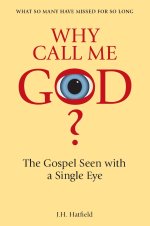Why Call Me God? : The Gospel Seen with a Single Eye

Author: J H Hatfield
Publisher: Capabel Press
This book breaks fresh ground in our age by bringing to light a matter of immense cultural importance, the secret meaning of the Gospels.
The approach taken is to dissect the riddles, as found in the Greek source texts. In this way we learn to identify two elementary compositional devices deployed by the authors to conceal, within their literal text, an additional component of the gospel message.
Specifically these are anagrammatic dispersion and homophonic allusion. Between them they provide the reader in Greek with the ‘keys’ that give access to the hidden portion of the message. Long lost these ‘keys to the kingdom of the Heavens’ may be; but safely embedded in the Greek text, they have survived intact for almost two millennia.The book shows how these compositional methods are first exploited in the Septuagint version of Genesis, then used again around 350 years later in the gospels. A particularly important application for anagrammatic dispersion involves the sevenfold ‘sign’ for Cain. Initially declared and adopted in the Septuagint version of Genesis, this works by concealing within other words the four Greek letters required to spell Cain’s name. It is widely exploited in the gospels in connection with Jesus, perhaps most tellingly of all with the Greek word which crops up when Judas delivers his fatal kiss.
Once familiar with the general principles, we discover we can solve the riddles in the gospels one after another with considerable ease. Our own experience as readers now aligns with the assertion made at Mt.13:12 that “To whoever has, it will be given to him and he will have in abundance; but whoever does not have, even what he has will be taken from him”. This is a theme which appears six times in the three synoptic gospels. And remarkably, with what this book explains, the promised ‘abundance’ can become the experience of all who read in Greek!
Our eyes ‘opened up’ in this way, it is now that we glimpse the core of the ‘mystery’ set forth in the gospels. For in using the ‘keys’ to solve the succession of riddles we have gained access to something unexpected… the identities properly intended by the authors for the key protagonists in their narrative. Specifically we discover that ‘Jesus’ is equally Cain - disguised in plain sight, but nonetheless lined up for retribution on account of the death of his half-brother Abel.
We learn too that the ‘father’ to whom Jesus defers is equally the Genesis serpent.
Finally it becomes clear that the canonical gospels must be entirely Gnostic fiction, their theme predicated upon the notion of TWO gods, one good and the other evil. Of these two, the second is charged in the first chapter of Genesis with dominating all the earth.
It is clear, moreover, that the gospels have been devised with the explicit intention to lead astray the majority of their readers… precisely as has actually happened with the literalist tradition upheld to this day by the Christian churches.
Publication date:
Tuesday 1 September 2009
ISBN:
978-0-9562057-0-4